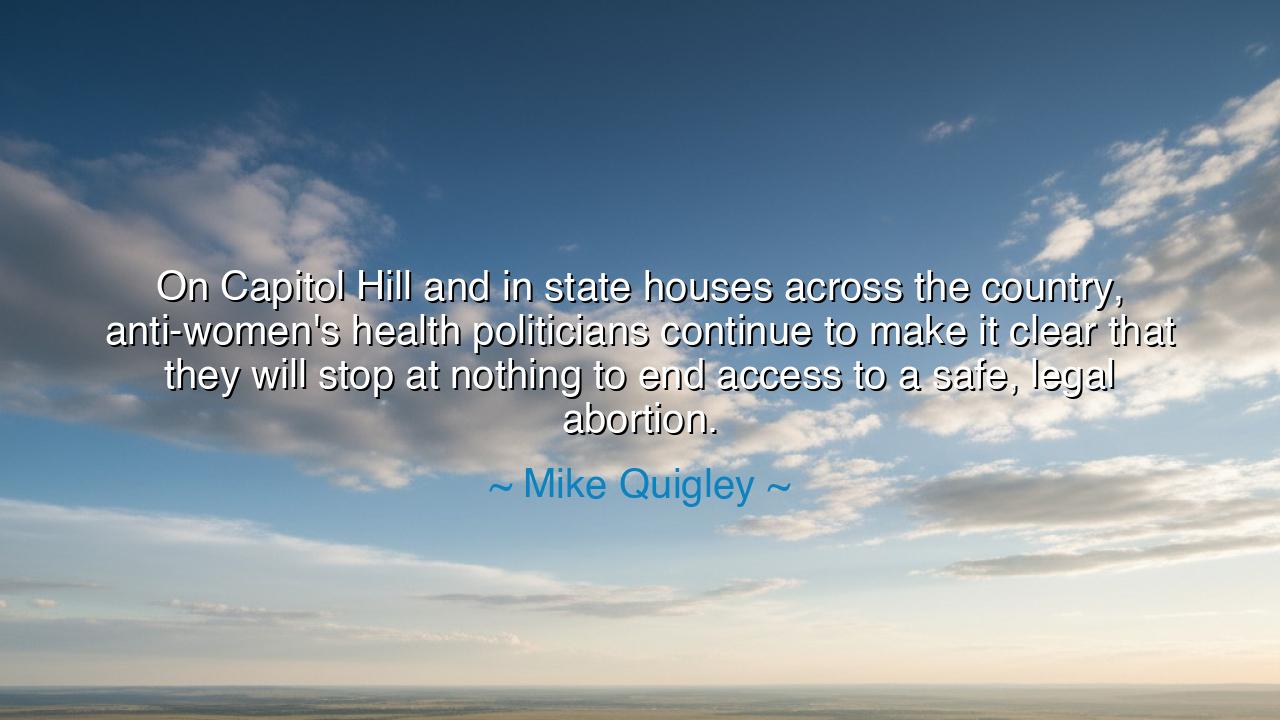
On Capitol Hill and in state houses across the country
On Capitol Hill and in state houses across the country, anti-women's health politicians continue to make it clear that they will stop at nothing to end access to a safe, legal abortion.






The words of Mike Quigley, “On Capitol Hill and in state houses across the country, anti-women’s health politicians continue to make it clear that they will stop at nothing to end access to a safe, legal abortion,” resound like a cry from the battlegrounds of justice — a lament and a warning intertwined. In these words lives the echo of countless generations of struggle — the battle between freedom and control, between the voice of the individual and the command of authority. Quigley does not speak merely of policy, but of power — the ancient and recurring question of who holds dominion over the body, and who decides the fate of life within it. His statement is a defense of autonomy, a declaration that to strip a woman of choice is to unmake her as a citizen and as a free being.
The origin of this quote lies within the modern storm of America’s ongoing conflict over reproductive rights — a debate that has raged from the decision of Roe v. Wade in 1973 to the present day. Mike Quigley, standing as a lawmaker and advocate for women’s health, spoke in response to a rising tide of legislation across states seeking to restrict or abolish the right to safe, legal abortion. Yet behind these battles of law lies something deeper — the moral and emotional inheritance of humanity’s long history of inequality. From ancient codes that defined women as property to modern laws that still dictate their medical choices, the fight for bodily sovereignty is as old as civilization itself.
In every age, the control of women’s bodies has been the tool by which power preserved itself. The ancients told tales of this truth: of Lysistrata, who led the women of Greece to end war by claiming mastery over their own bodies; of Hatshepsut, who defied male hierarchy to rule Egypt as Pharaoh; and of countless unnamed women who resisted quietly, raising generations despite the laws that sought to silence them. Quigley’s words summon that same spirit of defiance — for when he says that these politicians “will stop at nothing,” he exposes not their strength, but their fear. For those who seek to rule the choices of others often do so not out of righteousness, but from a deeper terror: the fear of losing control.
The heart of his statement beats with urgency and remembrance. History has shown that when the right to choose is denied, the result is not purity, but peril. When abortion is banned, it does not vanish — it retreats into shadows, where danger thrives. In the early twentieth century, before abortion was legalized in the United States, women died in secret rooms and on cold tables, victims not of immorality but of law without mercy. Doctors like Dr. Henrie Lacks and advocates like Margaret Sanger risked their reputations — even their freedom — to provide medical care and education to women in need. Their courage carved the first paths toward dignity. To forget their sacrifice is to invite history’s cruelty to return.
Yet Quigley’s words are not despairing; they are a call to vigilance. He warns that the struggle for women’s health is never permanently won, but must be renewed with every generation. Power, like a tide, always seeks to reclaim what freedom has claimed. It is the duty of those who understand liberty not to turn away in weariness, but to speak and act, again and again, until justice becomes unassailable. In this sense, Quigley’s voice joins the ancient chorus of reformers, philosophers, and prophets who taught that law must serve compassion, or it becomes tyranny.
The lesson to draw is clear: rights not defended are rights surrendered. To preserve access to safe and legal healthcare, one must not rely on others’ vigilance but cultivate one’s own. The ancients taught that the health of a nation is measured not by its wealth or its armies, but by how it treats its most vulnerable. In every city, every council, every home, there must be voices that stand for choice, for compassion, for truth over ideology. To remain silent while others lose their freedom is to share in their oppression.
So, let Quigley’s words be carried forward like a torch through the corridors of time: that no law written in fear can silence the truth of equality. The body is sacred, not to the state, but to the soul that inhabits it. The right to decide one’s path, one’s health, one’s future — that is the foundation of all liberty. Let every generation remember that freedom is not inherited; it is defended. And when it comes to the rights of women, let the people say as one — this choice is ours, and we will not surrender it.






AAdministratorAdministrator
Welcome, honored guests. Please leave a comment, we will respond soon